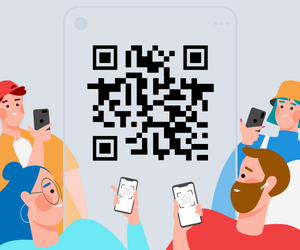
Beware of Fake QR Codes
Restaurants, stores, and other businesses have recently been utilizing QR code technology to create a more innovative experience for the customer. However, threat actors are creating malicious QR codes and slapping them over these innovative features to trick victims into scanning them, compromising their information. The FBI is now warning people about these fake QR codes.
“QR or 'Quick Response' codes have been connecting scanners to real-world objects since the 1990s, but got widely adopted during the pandemic as businesses moved to contactless communication and payments via QR codes on restaurant menus, parking meters and other public spaces.” (ZDNet). “But scammers are now targeting the QR code's increased familiarity by tampering with the pixelated barcodes and redirecting victims to sites that steal logins and financial information, according to an FBI alert.”
The FBI noted the dangers of scanning QR codes as far back as October, noting that they had been receiving reports and to be aware of the danger lurking.
“The FBI in October said it had recently started to receive reports about malicious QR codes being used, particularly in cryptocurrency scams. ‘Crypto transactions are often made through QR codes associated with crypto accounts… making these transactions easy marks,’ the FBI noted.” (ZDNet).
“‘Do not scan a randomly found QR code,’ the FBI warned.”
It is also noted that the pandemic could have been a catalyst in this area of cyber-attacks, as social distancing permitted the popularity of QR codes.
“‘While QR codes have been around for a very long time, certainly in recent years, they've gained more widespread use,’ Dave Ring, section chief of the FBI's Cyber Division told ABC News. ‘Part of that is with the pandemic and a drive toward being as contactless as possible, QR codes give people the opportunity to just use their phone camera and scan a QR code.’” (ABC).
Overall, it is suggested that one uses caution using QR codes and navigating websites accessed via scanning them.
“There are parallels between email phishing and malicious QR codes stuck on public spaces. How do people know which ones to trust? Employee cyber-awareness training usually tells users not to click on links from unsolicited email, but they still do. Some of the FBI's self-defense advice warns against following common practices when using a QR code, but the overall message is to exercise caution when entering information from a website accessed via a QR code.” (ZDNet).
Have any questions about cyber-security? Responsive Technology Partners is the leading cyber-security expert in the Athens, Metter, Milledgeville, Vidalia, and Atlanta, Georgia areas. We also have locations in Tampa, Florida, Roanoke, Virginia, and Raleigh South Carolina. Service offerings include I.T. support, cyber-security and compliance, telephony, cloud services, cabling, access control, and camera systems. Our company’s mission is to provide world-class customer service through industry leading I.T. solutions that make every customer feel as if they are our only customer. Please visit our website to learn more: https://www.responsivetechnologypartners.com/.
Sources:
ABC. https://abcnews.go.com/Politics/fbi-warns-criminals-fake-qr-codes-scam-users/story?id=82371866




